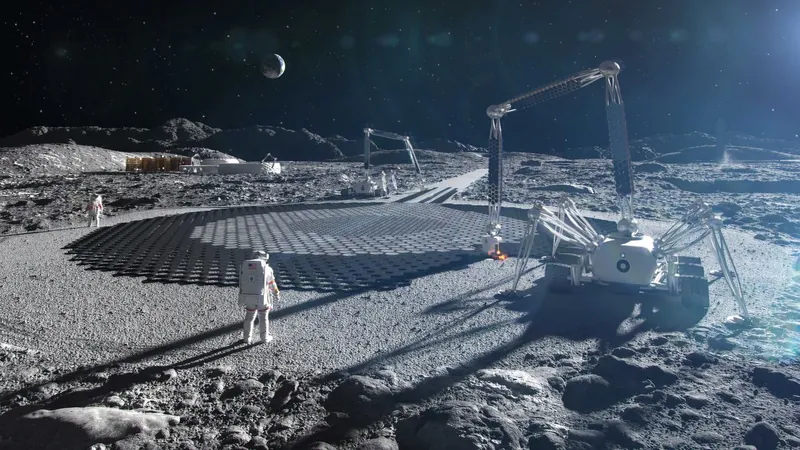
Should We Mine the Moon? 4 Crucial Questions for Humanity's Future in Space
2025-01-09
Author: Yu
Should We Mine the Moon? 4 Crucial Questions for Humanity's Future in Space
1. Why Mine the Moon?
The motivation behind lunar mining is multifaceted. With rising space exploration costs driven by logistics from Earth, the moon presents an opportunity to source critical materials much closer to home. Companies, notably private startups, are racing to figure out how to extract lunar resources, including precious water ice. Currently, it can cost more than gold to send a liter of water to the moon, but mining lunar ice could dramatically reduce expenses and make future missions to Mars more feasible.
Additionally, the moon could alleviate the strain on Earth's finite supplies of rare Earth metals, which are essential for modern technology. As nations like China also join the race, the competition intensifies.
2. How Will Mining Change Our Vision of the Moon?
The extraction process on the moon will invariably alter its appearance. Unlike Earth, the moon lacks an atmosphere, which allows dust created during mining activities to travel significant distances. Extracting material from the lunar surface can change the moon’s reflective properties, leading to brighter and duller patches due to the disturbed and resettled dust. This raises questions about how these visual changes might affect not only scientific observations but also cultural perceptions of our celestial neighbor.
3. Who Owns the Moon?
The question of ownership over lunar resources remains murky. The Outer Space Treaty of 1967 prohibits any nation from claiming sovereignty over celestial bodies, but the legality of commercial mining ventures remains a gray area. The Moon Treaty of 1979 suggests that the moon is the "common heritage of mankind," potentially opposing mining operations. Conversely, the 2020 Artemis Accords endorse the extraction of resources while maintaining that no ownership claims can be made on the moon itself.
This leads to further ethical debates about whether the benefits of lunar mining will be shared globally or restricted to wealthier nations and corporations, sparking concerns about fairness in space exploration.
4. What Will Life be Like for Lunar Miners?
Working on the moon will pose significant health and safety risks. Imagine laboring 12 hours in the harsh, low-gravity environment, facing dehydration, exhaustion, and potential injuries. This scenario underscores the dire need for stringent safety regulations. Health concerns such as bone and muscle loss, osteoporosis, and heightened risk of cosmic radiation-induced illnesses are just a few challenges miners will face.
Moreover, the isolation and psychological stress of working on the moon must not be underestimated. With regulatory bodies located on Earth, miners may find it difficult to advocate for their rights and ensure safe working conditions.
Overall, the moon offers vast potential as a resource hub for humanity's future endeavors in space, but we must tread carefully. Establishing robust policies that prioritize safety, equity, and human rights is essential as we stand on the brink of a new era in space exploration. Before we embark on this cosmic venture, let's ensure we have the frameworks in place to protect both our workers and the moon itself for generations to come.
Could lunar mining lead us to another era of resource wars, or will we chart a new path of sustainability and cooperation? The future of the moon—and our place in the universe—depends on our choices today.

 Brasil (PT)
Brasil (PT)
 Canada (EN)
Canada (EN)
 Chile (ES)
Chile (ES)
 Česko (CS)
Česko (CS)
 대한민국 (KO)
대한민국 (KO)
 España (ES)
España (ES)
 France (FR)
France (FR)
 Hong Kong (EN)
Hong Kong (EN)
 Italia (IT)
Italia (IT)
 日本 (JA)
日本 (JA)
 Magyarország (HU)
Magyarország (HU)
 Norge (NO)
Norge (NO)
 Polska (PL)
Polska (PL)
 Schweiz (DE)
Schweiz (DE)
 Singapore (EN)
Singapore (EN)
 Sverige (SV)
Sverige (SV)
 Suomi (FI)
Suomi (FI)
 Türkiye (TR)
Türkiye (TR)
 الإمارات العربية المتحدة (AR)
الإمارات العربية المتحدة (AR)